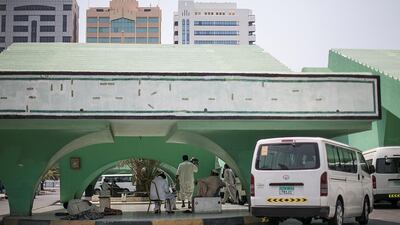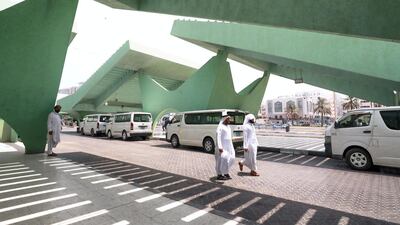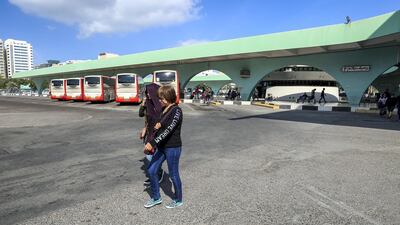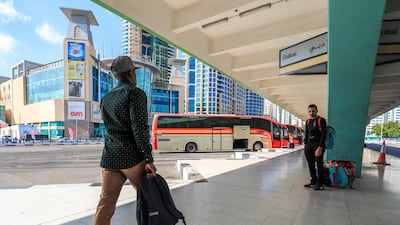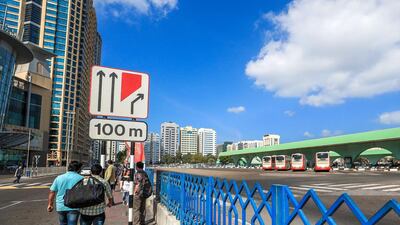On Wednesday morning, Sher Adham Khan sat under the mint-green concrete canopy of the Abu Dhabi bus terminal waiting for customers, just as he has almost every day for 30 years.
The microbus taxis stopped running seven months ago but Mr Khan and the other microbus drivers still meet daily at the station. They can drive solo passengers but customers are few.
The coronavirus pandemic put the breaks on microbus taxis. In March, the federal government restricted vehicles to a maximum of two passengers to prevent the spread of the virus.
“We sit and wait to see our fate,” said Mr Khan, who followed his father to the UAE from Pakistan in the 1980s.
“If I sit at home, where will the money come from? If I return to my country, it might be difficult [to get a visa] when I’m ready to come back and work. Rules change every day.”
The drivers lounge on benches, sip tea, nap, chat and pray through the afternoons. In the evening, they return to crowded flats.
Drivers have lived off savings, delayed rent payments and stopped remittances.
“We had savings but now they’re gone,” said Mohammed Omar, 30, who has driven a microbus for 12 years.
“I’d go to Pakistan but I owe money and I can’t really work, so what can I do?
"Maybe one or two people come to the station a day and we’ll get 20 dirham to show for it.”
Even before the pandemic, business was slow. From 2009, a series of government regulations overhauled everything from parking to flat sharing and moved the city's lower income workers from the island downtown to mainland suburbs.
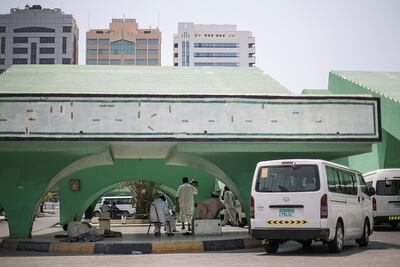
It was the same hard working community that took microbuses from Abu Dhabi to other emirates. As their numbers shrank, so did profit.
Yet the microbuses survived, even after the introduction of safer, larger inter-emirate buses.
Most drivers are from Waziristan in northern Pakistan and have worked in Abu Dhabi as microbus drivers their entire adult lives.
With the onset of the pandemic, drivers are divided on whether they should wait out the pandemic in Abu Dhabi or Waziristan. Some worry work visas will not be reissued if they leave and they will be unable to return to the Emirates.
“If I had money, I’d go,” said Shah Mohammed, a driver of 18 years who earned about Dh1,350 a month.
“Our sponsor said if we want to take another job, we can go for it.”
Prospects are limited for drivers, who typically have limited education.
“What job would I do? I don’t have education,” said Mr Omar, a father of seven.
“I left school after four years to earn money. My mother and father told me, ‘don’t go to school, we don’t have money to support you’.
“I earned Dh2,000 or Dh1,500 a month before corona. Now, I can’t even make Dh200. My mother, father and sister, tell me they really need money. I tell them, I have nothing to give.”
Drivers live in rooms with up to 20 people, sometimes renting beds in 12-hour shifts - often against government regulations. Despite crowded conditions, they said they do not worry about coronavirus, given testing is easily available to low-income workers and they are checked regularly.
Free door-to-door testing across the city is credited with driving down numbers in the capital.
“Just last week,” said Mr Mohammed, showing an SMS on his phone of a negative result.
Microbuses have been a part of Abu Dhabi's cityscape since the central bus station opened downtown in 1989. The ship-shaped terminal and its flying saucer restaurant, designed by Bulgarians with a penchant for brutalist Soviet architecture, are protected and recognised in grand plans to preserve Abu Dhabi's oil boom heritage.
The fate of the Pashtun microbus drivers is less certain.
Inside Star Al Raai Restaurant, drivers and passengers once sat shoulder to shoulder for servings of biryani.
But with the microbuses permanently parked, customers are gone, tables are packed away and hot dishes are off the menu.
“People only buy tea, water and sandwiches,” said Mohammed Riyas, a waiter of six years. “We get maybe 15 customers a day and must pay rent and electricity. We make maybe Dh50 a day. Before, we’d make about Dh1,100.
“When life comes back to the station, so will the biryani.”
Restaurant staff are skeptical that the microbus business will survive the pandemic.
Drivers keep hope.
“We have patience,” said Mr Omar. “If the government says go, we go. If they say, stay, we stay.
“After Corona, we’ll be working again. God willing, the buses will be here.”

